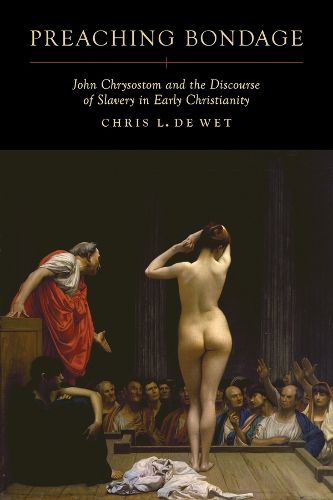Readings Newsletter
Become a Readings Member to make your shopping experience even easier.
Sign in or sign up for free!
You’re not far away from qualifying for FREE standard shipping within Australia
You’ve qualified for FREE standard shipping within Australia
The cart is loading…






Preaching Bondage introduces and investigates the novel concept of doulology, the discourse of slavery, in the homilies of John Chrysostom, the late fourth-century priest and bishop. Chris L. de Wet examines the dynamics of enslavement in Chrysostom's theology, virtue ethics, and biblical interpretation and shows that human bondage as a metaphorical and theological construct had a profound effect on the lives of institutional slaves. The highly corporeal and gendered discourse associated with slavery was necessarily central in Chrysostom's discussions of the household, property, education, discipline, and sexuality. De Wet explores the impact of doulology in these contexts and disseminates the results in a new and highly anticipated language, bringing to light the more pervasive fissures between ancient Roman slaveholding and early Christianity. The corpus of Chrysostom's public addresses provides much of the literary evidence for slavery in the fourth century, and De Wet's convincing analysis is a groundbreaking contribution to studies of the social world in late antiquity.
$9.00 standard shipping within Australia
FREE standard shipping within Australia for orders over $100.00
Express & International shipping calculated at checkout
Preaching Bondage introduces and investigates the novel concept of doulology, the discourse of slavery, in the homilies of John Chrysostom, the late fourth-century priest and bishop. Chris L. de Wet examines the dynamics of enslavement in Chrysostom's theology, virtue ethics, and biblical interpretation and shows that human bondage as a metaphorical and theological construct had a profound effect on the lives of institutional slaves. The highly corporeal and gendered discourse associated with slavery was necessarily central in Chrysostom's discussions of the household, property, education, discipline, and sexuality. De Wet explores the impact of doulology in these contexts and disseminates the results in a new and highly anticipated language, bringing to light the more pervasive fissures between ancient Roman slaveholding and early Christianity. The corpus of Chrysostom's public addresses provides much of the literary evidence for slavery in the fourth century, and De Wet's convincing analysis is a groundbreaking contribution to studies of the social world in late antiquity.